
In the summer of 1942 the German Sixth Army advanced to the city of Stalingrad as part of the Wehrmacht's Case Blue offensive to capture the oil fields of the Caucasus. In its attempt to capture the city the Axis forces were encircled and destroyed, in a battle that became perceived as a turning point in the Second World War.
At first, the Germans seemed to have won, taking most of the city in a series of bloody battles in the autumn of 1942, only to be caught off-guard and surrounded by the brilliance of the Red Army's Uranus counteroffensive. Ordered to stay put, Nazi high command tried to airlift in all the supplies the Sixth Army needed until a relief force could break through to them. Both operations failed, the airlift especially becoming a disaster.
In the city itself the fighting was almost indescribable as men fought for days for possession of a single house or even room. As winter took its icy hold, the trapped Germans began to starve, with soldiers dropping like flies from disease and malnutrition.
The Battle of Stalingrad became a byword for the horror and savagery of the war on the Russian Front. Hundreds of thousands of men from both sides fought for months amid the rubble of the shattered city, until the remnants of Sixth Army finally surrendered in January 1943. Almost 100,000 German troops trudged into captivity, the vast majority of whom would be dead within months. In the end only around 5,000 ever made it home alive from an army that once numbered 250,000. The German Army never recovered from the defeat, and for the German people there was a realisation that Stalingrad was a moment where the war turned against them.
Background to the battle
Diese Geschichte stammt aus der Issue 110-Ausgabe von History of War.
Starten Sie Ihre 7-tägige kostenlose Testversion von Magzter GOLD, um auf Tausende kuratierte Premium-Storys sowie über 8.000 Zeitschriften und Zeitungen zuzugreifen.
Bereits Abonnent ? Anmelden
Diese Geschichte stammt aus der Issue 110-Ausgabe von History of War.
Starten Sie Ihre 7-tägige kostenlose Testversion von Magzter GOLD, um auf Tausende kuratierte Premium-Storys sowie über 8.000 Zeitschriften und Zeitungen zuzugreifen.
Bereits Abonnent? Anmelden
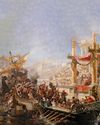
NAUMACHIA TRUTH BEHIND ROME'S GLADIATOR SEA BATTLES
In their quest for evermore novel and bloody entertainment, the Romans staged enormous naval fights on artificial lakes
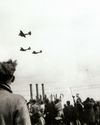
OPERATION MANNA
In late April 1945, millions of Dutch civilians were starving as Nazi retribution for the failed Operation Market Garden cut off supplies. eet as In response, Allied bombers launched a risky mission to air-drop food

GASSING HITLER
Just a month before the end of WWI, the future Fuhrer was blinded by a British shell and invalided away from the frontline. Over a century later, has the artillery brigade that launched the fateful attack finally been identified?
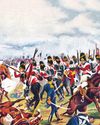
SALAMANCA
After years of largely defensive campaigning, Lieutenant General Arthur Wellesley went on the offensive against a French invasion of Andalusia

HUMBERT 'ROCKY'VERSACE
Early in the Vietnam War, a dedicated US Special Forces officer defied his merciless Viet Cong captors and inspired his fellow POWs to survive
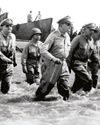
LEYTE 1944 SINKING THE RISING SUN
One of the more difficult island campaigns in WWII's Pacific Theatre saw a brutal months-long fight that exhausted Japan’s military strength

MAD DAWN
How technology transformed strategic thinking and military doctrine from the Cold War to the current day

BRUSHES WITH ARMAGEDDON
Humanity came close to self-annihilation with the Cuban Missile Crisis, Broken Arrows’ and other nuclear near misses
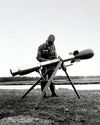
THE DEADLY RACE
How the road to peace led to an arms contest between the USA and USSR, with prototypes, proliferation and the world’s biggest bomb

THE MANHATTAN PROJECT
Einstein, Oppenheimer and the race to beat Hitler to the bomb. How a science project in the desert helped win a war